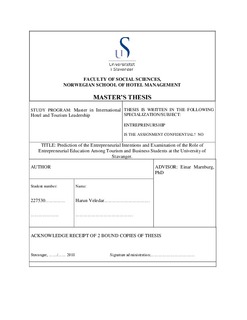| dc.contributor.advisor | Marnburg, Einar | |
| dc.contributor.author | Veledar, Harun | |
| dc.coverage.spatial | Norway | nb_NO |
| dc.date.accessioned | 2018-09-18T11:43:59Z | |
| dc.date.available | 2018-09-18T11:43:59Z | |
| dc.date.issued | 2018-06-14 | |
| dc.identifier.uri | http://hdl.handle.net/11250/2563200 | |
| dc.description | Master's thesis in International Hospitality Management | nb_NO |
| dc.description.abstract | The current study has been conducted with two main purposes. The first purpose of this study was to understand the entrepreneurial intentions among the students of tourism and business study program at the University of Stavanger. The second purpose of the study was illumination of the influences that entrepreneurial education has on the entrepreneurial intentions among tourism and business students at the University of Stavanger. In order to understand student’s entrepreneurial intentions, the study has applied the Theory of Planed Behavior and formed the conceptual model with three hypotheses. Regardless of the conceptual model, the study has extended for the fourth hypotheses regarding entrepreneurial education. The final sample has consisted of 168 (first and third year) students of both study programs. The study follows quantitative research design. Hence, the data were analyzed with set of parametric statistics. The statistical analyses have reported several findings. First, the study has found that all three attendances of the TPB were significant predictors of the student’s entrepreneurial intentions. Second, among the three attendance the attendance attitudes toward behavior was the most significant predictor of the entrepreneurial intentions. Third, the findings suggest that the group of students who were part of entrepreneurial education had more positive consideration of the entrepreneurial intentions. As other studies, this study as well has it limitation. The major limitation of the present study is the fact that the final sample has included only undergraduate students of two study programs. Future studies should include the master students and students of other study programs. Practical implication of study suggest that entrepreneurship should be treat as intentional activity which requires mutual efforts of individuals and institutions. | nb_NO |
| dc.language.iso | eng | nb_NO |
| dc.publisher | University of Stavanger, Norway | nb_NO |
| dc.relation.ispartofseries | Masteroppgave/UIS-SV-NHS/2018; | |
| dc.subject | hotelladministrasjon | nb_NO |
| dc.subject | reiselivsadministrasjon | nb_NO |
| dc.subject | entrepreneurship | nb_NO |
| dc.subject | theory of planned behavior | nb_NO |
| dc.subject | entrepreneurial education | nb_NO |
| dc.subject | entrepreneurial intentions | nb_NO |
| dc.subject | students | nb_NO |
| dc.title | Prediction of the Entrepreneurial Intentions and Examination of the Role of Entrepreneurial Education Among Tourism and Business Students at the University of Stavanger. | nb_NO |
| dc.type | Master thesis | nb_NO |
| dc.subject.nsi | VDP::Samfunnsvitenskap: 200::Økonomi: 210::Bedriftsøkonomi: 213 | nb_NO |
